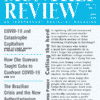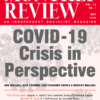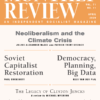
The good-for-business wars
A new poem by Marge Piercy. | more…

Culling the herd
A new poem from Marge Piercy. | more…

May 2020 (Volume 72, Number 1)
In its wider economic, ecological, epidemiological, and public health context, the current COVID-19 pandemic demonstrates the enormous dangers of the metabolic rift in human ecology and epidemiology brought on by capitalist social relations in the age of monopoly-finance capital, global agribusiness, and intricate, globe-spanning supply chains associated with the extreme exploitation and expropriation of both human beings and nature. Neoliberalism, representing the inner logic of capitalism, has left the world vulnerable to catastrophe wherever it has come into play. | more…

COVID-19 and Circuits of Capital
COVID-19, the illness caused by coronavirus SARS-CoV-2, the second severe acute respiratory syndrome virus since 2002, is now officially a pandemic. As of late March, whole cities are sheltered in place and, one by one, hospitals are lighting up in medical gridlock brought about by surges in patients. | more…

Science and Politics
Hilary Rose, a sociologist, and Steven Rose, a neuroscientist, were two of the principal founders of the British Society for Social Responsibility in Science in the late 1960s in London. They speak about their work as scientists and antiwar activists, particularly around the issue of Palestinian liberation. | more…

Engels vs. Marx?: Two Hundred Years of Frederick Engels
At the bicentenary of his birth, Frederick Engels’s reputation as an original thinker is, among Anglophone academics at least, at its nadir. Despite the recent global economic crisis and associated increases in inequality that have tended to confirm Karl Marx and Engels’s general critique of capitalism, Marxism is an optimistic doctrine that has not fared well in a context dominated by working-class retreat and demoralization. But if this context has been unpropitious for Marxism generally, criticisms of Engels’s thought have a second, quite separate, source. Over the course of the twentieth century, a growing number of commentators have claimed that Engels fundamentally distorted Marx’s thought, and that “Marxism” and especially Stalinism emerged out of this one-sided caricature of Marx’s ideas. | more…

It’s Still Slavery by Another Name
As the long history, right to the present day, of police and vigilante violence against black people has shown with great clarity, the racial chasm between black and white people in the United States lives on. A few black men and women have climbed into the 1 percent, and a sizable African-American middle class now exists. But by every measure of social well-being, black Americans fare much worse than their white counterparts. Just as for the economic, political, and social distance between capitalists and workers, so too is there a differential between black and white people, for these same interconnected components of daily life continue because of the way our system is structured. | more…

Postcolonial Reconstruction in Ghana, 1952–66
In 1952, the West African nation of Ghana, recently having freed itself from British imperialism, set out on a project of radical economic reconstruction unmatched anywhere on the continent in scope and ambition. Having attained political independence with the creation of a sovereign parliament and executive office, the Convention People’s Party under the leadership of Kwame Nkrumah drew up extensive plans for ensuring the conditions necessary for real, not just on-paper, independence. | more…

And then, I think about war
A new poem by Linda Backiel. | more…

April 2020 (Volume 71, Number 11)
Today, at the bicentennial of Frederick Engels’s birth, it is worth taking a brief look at Engels’s theory of the labor aristocracy, its connection to V. I. Lenin’s thinking, and the significance of these ideas in light of the current capitalist conjuncture. | more…

The Rift of Éire
Karl Marx’s (and Frederick Engels’s) analysis of nineteenth-century Irish history revealed what is referred to as “the rift of Éire” in the colonial period. Indeed, it is in relation to the analysis of the systematic disruption of the Irish environment that Marx’s ecological inquiries can be seen as taking on a concrete and developed form, encompassing the ecological as well as economic robbery that characterized the Irish colonial regime. | more…
How Long Can Neoliberalism Withstand Climate Crisis?
The climate crisis is proving to be antithetical to the neoliberal machines that define current forms of social organization. Reducing fossil fuel consumption, the largest contributor to climate change, requires collaborative efforts. These efforts must take into consideration the foundational role of fossil fuels in modern economies. Yet, renewables lack many of the characteristics that have made fossil fuels so desirable in production processes, limiting their ability to expropriate human labor. At the same time, climate catastrophes, such as wildfires and hurricanes, disrupt the infrastructural momentum of fossil fuel economies, destabilizing the mechanisms of capital accumulation that derive from the production and consumption of these fuels. All of these problems have come to a head in the recent crises in Chile and California. | more…

Crisis of Socialism and Effects of Capitalist Restoration
The main criticism leveled at the socialist economies was that a planned economy was inherently less efficient than a market one, due to the sheer scale of the bureaucratic task involved with planning a major economy. But the collapse of the Soviet and later the Russian economy under Mikhail Gorbachev and then Boris Yeltsin was an economic disaster that was otherwise unprecedented during times of peace. The world’s second superpower was reduced to the status of a minor bankrupt economy with a huge decline in industrial production and in living standards. | more…